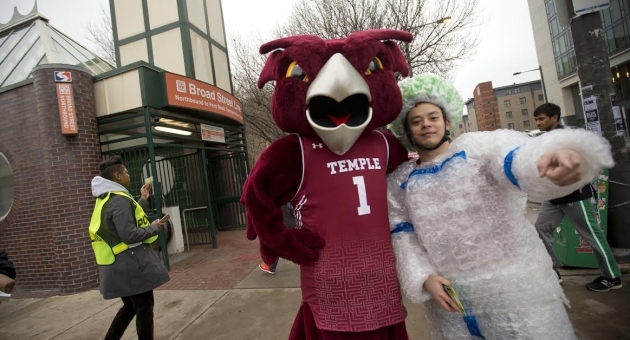
Every five hours in Philadelphia, a pedestrian is hit by a car.
In order to raise awareness about pedestrian safety—and the easy ways in which people can protect themselves by changing their habits—the state Department of Transportation and Philadelphia officials, with support from Temple University, last week launched It’s Road Safety, Not Rocket Science, a new education, enforcement and engagement campaign.
At a Thursday, April 9, press conference at Broad Street and Cecil B. Moore Avenue, PennDOT, the Street Smarts-Philadelphia Highway Traffic Safety Project, the Philadelphia Mayor’s Office of Transportation and Utilities, Philadelphia Police and Temple University’s Campus Safety Services kicked off pedestrian safety awareness activities and encouraged safe street-crossing behaviors.
Ema Yamamoto, project manager in the Mayor’s Office of Transportation and Utilities, noted that more than 1,800 pedestrians in Philadelphia were hit by drivers in 2013, leading to 37 deaths. The citywide awareness campaign has a special focus on 18- to 35-year-olds, who make up 40 percent of drivers who hit pedestrians and 30 percent of pedestrians who are hit.
“These are shocking statistics,” she said. “Injuries and fatalities caused by traffic crashes are not mundane, and they should not be an acceptable part of our lives here in Philadelphia.”
Yamamoto was joined at the press conference by Philadelphia Police 22nd District Capt. Robert Glenn and Temple Police Capt. Eileen Bradley, who praised the risk-prevention partnership and its emphasis on simply walking—not talking on the phone or texting—when crossing streets.
The key message of the new campaign is right in its title: Being safe isn’t as difficult as rocket science. Three easy ways to stay safe as a pedestrian are to pick your head up, put your phone down and pay attention. This campaign also asks drivers to do the same, in order to keep pedestrians safe.
In order to spread that message, the Mayor’s Office of Transportation and Utilities recently held pop-up pedestrian safety events, including on Main Campus, featuring “safety suiters” clad in outlandish bubble-wrap helmets or flashing lights in order to protect themselves as they engage in risky behaviors such as burying their heads in their phones as they cross busy streets. From these events, the city produced a series of public-service announcements.
Several Temple students volunteered as safety suiters: Richard Li, a Class of 2015 media studies and production major, wore hazard stripes, flashing lights and knee pads. He and Liuchuan (Rachel) Yang, a Class of 2017 entrepreneurship major, and Michael Wong, a Class of 2015 criminal justice major, targeted busy areas of campus and told students with phones to put them down and be careful walking.
“We as a city and as citizens must continue to make the active choice to engage in safe driver-pedestrian interactions,” Yamamoto said. “Whenever each of us steps out of a car, steps off of a bus or dismounts from a bicycle, we’re all pedestrians. At the end of the day, this program is about each and every Philadelphian and making sure that we all get home safe.”